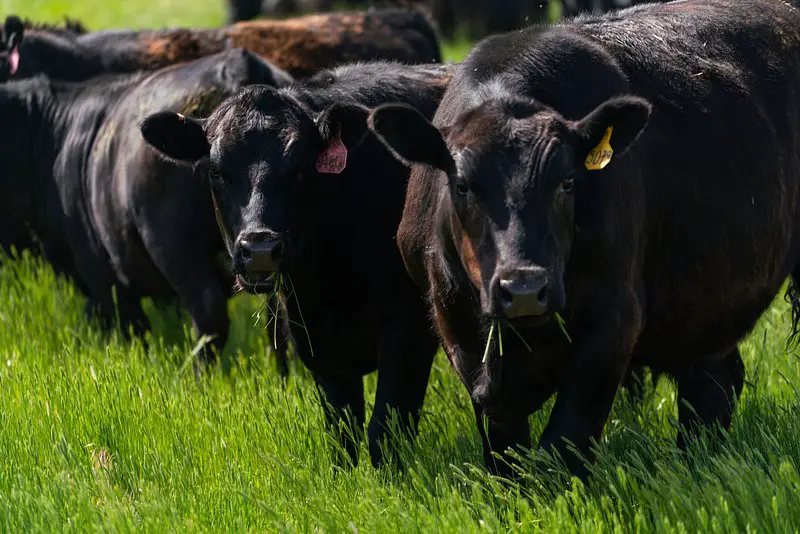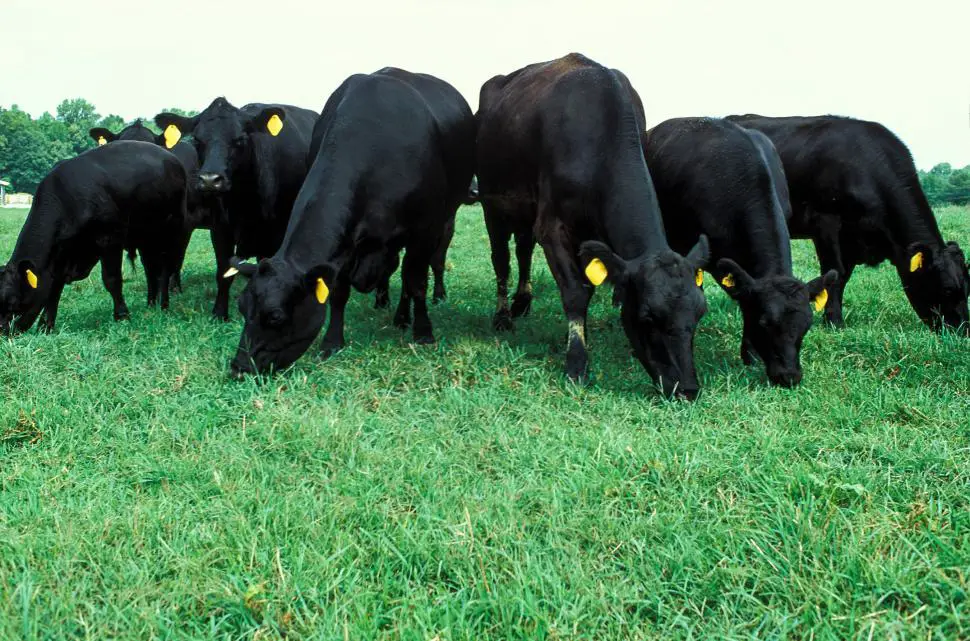
Steak lovers, rejoice! If you’ve ever indulged in a juicy, perfectly marbled steak, there’s a good chance a Black Angus cow played a part in that delicious experience. These iconic black cattle are the backbone of the premium beef industry. But what’s the story behind these famous cows? Let’s dive into their origins, traits, and what makes them both special and potentially challenging.
Origin
The journey of the Black Angus began in the rugged landscapes of Scotland. Farmers in northeastern regions like Aberdeenshire prized these hardy black cattle, sometimes called “Doddies”, for their ability to produce flavorful beef even in the harsh Scottish climate. Their reputation slowly spread, but it was in the 1800s when Black Angus truly began their global takeover.
Characteristics
- Color Me Black: The most defining feature of Black Angus cows is their solid black coat. This makes them easily identifiable in the pasture.
- No Horns, No Fuss: Naturally polled, meaning they don’t grow horns, makes Black Angus safer to handle and eliminates the need for dehorning.
- Maternal Superstars: Black Angus cows are known for being excellent mothers. They generally have easy calving, protective instincts, and plenty of milk to raise strong calves.
Advantages of Black Angus Cows
- The Marbling Queen: This is where Black Angus cows truly shine. Their genetics favor excellent marbling – those fine streaks of fat within the muscle that translate to juicy, flavorful, and incredibly tender steaks.
- Market Powerhouse: The consumer love for Angus beef drives strong demand in the beef industry. This can mean good returns for farmers raising these cattle.
Disadvantages of Black Angus Cows
- Feeling the Heat: The black hide of Black Angus absorbs sunlight, making them susceptible to heat stress in very hot climates. Farmers in those regions might need special management strategies.
- Popularity Comes at a Price: Due to their high demand, sourcing quality Black Angus breeding cows can be expensive. Be prepared for a higher investment compared to some less sought-after breeds.
Characteristics Table
| Characteristic | Description |
|---|---|
| Color | Solid black (rarely small white patch on udder) |
| Heat Tolerance | Moderate (better suited for temperate climates) |
| Average Weight (cows) | 1,200-1,400 lbs (544-635 kg) |
| Average Weight (bulls) | 1,800-2,000 lbs (816-907 kg) |
| Size | Medium frame |
| Temperament | Docile, easy to handle |
| Maternal Traits | Excellent (good fertility, easy calving, protective mothers) |
| Milk Production | Moderate (enough for calf but not significant for dairy) |
| Beef Production | Excellent (high-quality marbled beef, efficient feed conversion) |
| Other Notable Traits | Naturally polled (hornless), adaptable to various environments, longevity, good carcass quality (high dressing percentage), popular breed for crossbreeding |
Black Angus Cow Price
So, how much does a Black Angus cow cost? Unfortunately, there’s no single answer. Here’s why:
- Age and Breeding Status: Young heifers, mature cows, and bred cows will have different price tags.
- Quality and Pedigree: Cows with proven genetics that produce top-quality calves will fetch a premium.
- Location and Market: Prices fluctuate based on regional demand and market conditions.
Tip: Contact local cattle auctions or breeders associations in your area for a better idea of current Black Angus cow prices.
FAQ
What is the Black Angus cow known for?
Producing high-quality, marbled beef.
Why is Black Angus beef so good?
Marbling is the key to a tender, juicy, flavorful eating experience.
Are Black Angus cows friendly?
Generally, they’re calm, but like any cattle, temperament can vary depending on handling and individual animals.
How much is a full Black Angus cow worth?
Prices change, but you’ll often pay more for Black Angus due to their popularity and value in the beef .

Conclusion
Black Angus cows have earned their place at the forefront of the beef industry. Their ability to produce premium beef, combined with their good maternal instincts, make them a valuable asset for producers. Of course, factors like heat sensitivity and the cost of obtaining them are important considerations.
Let’s Talk Beef!
Do you enjoy Angus steaks? Have you had experience raising Black Angus cattle? Share your thoughts in the comments below!
